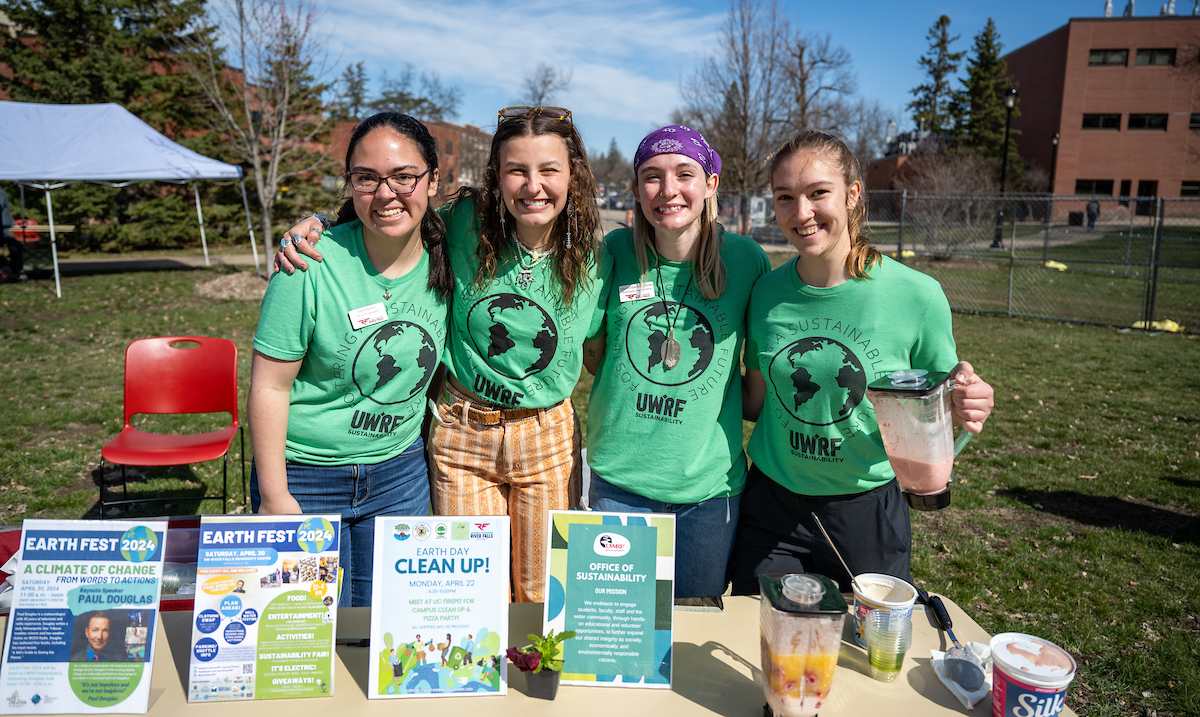Sustainable Opportunities
As a student at UW-River Falls, you have access to a wide variety of ways to get involved with sustainability efforts on campus and in the River Falls community. Explore this page to learn more about student organizations, employment opportunities, volunteer openings and more!
Are you interested in getting involved in any of the organizations or activities on this page? If so, email sustainability@uwrf.edu to help get connected!

Student Organizations
Find a Student Org
There are several ways to get involved with sustainability efforts at UWRF! There are several student organization that focus on or are related to sustainability including:
- Environmental Sustainability Club
- Resource Management Club
- Green Team
- Bee Club
- Horticulture Society
- Biology Club
- Pre-Health Society
More information on student organizations can be found on Falcons Connect.
Community Involvement and Service Opportunities
Volunteer Opportunities
You can also get involved with sustainability in the community!
- Grow to Share engages community members in a collaborative community garden, sharing harvest with families in need. Garden working during the growing season (April through October). Volunteers can also assist with events, including children's programming, and fundraising events. Everyone is welcome - all ages and ability levels.
- The River Falls Community Food Pantry aims to provide food, with respect and dignity, in times of need to those in the River Falls community. Volunteers needed for variety of duties during open hours at the pantry. These include: working with clients, (checking them into our computer system and answering questions, assisting with bagging and bringing groceries to vehicles), stocking shelves, accepting donations from community members, sorting donations, and other duties as assigned. Excellent customer service skills a must!
- Our Neighbors' Place connects people in crisis with housing, food, and essential resources—helping individuals and families across Pierce and St. Croix counties move toward stability and independence. Opportunities include assisting guests and sorting donations at The Closet; fixing things and cleaning up with the Maintenance Crew; stocking shelves and packing weekend meals for students with the Backpack Program; planning special events and fundraising; and guiding the mission as a Board Member.
- St. Croix Valley Habitat for Humanity builds affordable, sustainable, quality homes that are sold to homebuyers through no-profit, no-interest loans. SCVHFH volunteers help with tasks from pounding nails to painting, serving on the Board of Directors to helping customers in our ReStore.
- Turningpoint provides safety, support, and strength to individuals and families experiencing domestic and sexual violence. Volunteer are needed to work at Second Chances Thrift Store and as Medical Response Advocates providing on call advocacy, resources, and crisis intervention for victims of sexual and domestic violence at local emergency rooms or at the St. Croix Valley SART center.
- The Prairie Enthusiasts-St. Croix Valley Chapter is a grassroots community dedicated to protecting rare prairie and savanna habitats in the St. Croix Valley. Volunteering at a Work Party is a great way to visit some of The Prairie Enthusiasts most special sites, while helping with stewardship activities that keep the prairies healthy and thriving.
- Carpenter St Croix Valley Nature Center preserves wildlife habitats while providing educational experiences for community families. Volunteer opportunities are broad, including environmental education, animal care, grounds keeping, helping with special events, and more.
Professional Networks
Access Resources
- The Association for the Advancement of Sustainability in Higher Education (AASHE) is the leading association for the advancement of sustainability in higher education. All UWRF faculty, staff and students with a valid uwrf.edu email address are able to create an account to access an abundance of sustainability resources in the resource hub section of the website.
- The Upper Midwest Association for Campus Sustainability (UMACS) is a network of staff, faculty and students from colleges and universities in the Upper Midwest that are working together to promote sustainability.
- The College and University Recycling Coalition (CURC) is a non-profit organization facilitating the exchange of technical knowledge and best practices for recycling and waste reduction programs among institutions of higher learning.
- UW-Sustainability assists in developing sustainability and energy related policies and standards for the UW, leading system wide initiatives, coordinate broad energy planning and working with all campuses to assist in meeting their energy and sustainability goals.
Student Employment
UW-River Falls has a team of students serving as sustainability representatives educating their fellow students on sustainability. The students host several campus events each year, coordinate social media posts and maintain a sustainability newsletter educating people on sustainability and making them aware of various regional sustainability events. The students also assist in seeking out, organizing and implementing initiatives to advance sustainability on campus.
Student Coordinators
- Autumn Frederick - Student Manager and Communications Coordinator
- Anya Rasmussen - Academics and Research Coordinator
- Emily Rose - Water and Energy Efficiency Coordinator
- Lucy Cahn - Waste Minimization Coordinator
- Lydia Degross - Student Representative
- Michael Engstrom - Food, Health and Wellbeing Coordinator
- Poe Broskoff - Student Representative
- Vinny Lamantia - Grounds Coordinator
- Willow Olker - Student Representative
Green Fund
The Green Fund is an allocable segregated university fee created to support sustainability initiatives and projects at UWRF. The Green Fund supports both the UWRF Sustainability Office and acts to provide further funding for projects that improve sustainability. Since the Green Fund is a student segregated fee, the Sustainability Senator of the Student Government Association oversees administration. Students, faculty and staff can apply for funding through the Green Fund.
UWRF defines sustainability as our local and global responsibility to meet the needs of present and future generations, as demonstrated by an integrated set of ecological, social and economic values, principles and practices that frame how we think, choose and act in personal, professional and community life.
Green Fund Categories
Funded projects or initiatives must fall under at least one of the following categories:
- Educational/Promotional - This category allows for educational/promotional campaigns or resources to raise awareness and inform students of sustainability initiatives or opportunities on campus. Examples include informational booths and kiosks, sticker campaigns, reusable promotional products, and more.
- Non-Academic Research - Non-academic research such as pilot projects, surveys, data collection, etc. can be funded to help inform UWRF's sustainability efforts and initiatives. Academic research is not to be funded by the Green Fund due to alignment with Administrative Policy 820.
- Energy - This category allows for renewable energy and energy efficiency initiatives to assist in reducing the campus' energy consumption and reliance on fossil fuels. This may also allow for the purchase of renewable energy credits or renewable energy programs through utility companies.
- Food - This category can be used to increase sustainable food, as defined by the AASHE Sustainability Tracking, Assessment, and Ratings System (STARS) definition, which includes local/regional, healthy, culturally diverse, and environmentally and socially progressive food options. This category may also use funding to increase transparency of on-campus food services.
- Buildings, Design, and Construction - This category is to support sustainable construction and renovations of campus buildings.
- Grounds - Projects in this category will work with the grounds department to approve and implement sustainable garden design and sustainable landscaping practices. Funds can be used to protect and preserve the naturally existing ecology as well.
- Water Conservation - This category addresses water conservation, pollution, and stormwater mitigation.
- Waste Minimization - This category addresses the improvement of waste diversion and reduction efforts on campus. The waste minimization category can be used to promote the reduction and reuse of materials.
- Transportation - This category includes all sustainable travel methods with low to no fuel, such as biking, walking, carpooling, carsharing, etc.
Application, Guides, Criteria and Scoring Rubric
Green Careers and Entrepreneurship
The need and opportunity for our students and regional citizens to consider "green careers" has never been greater, and it will only grow. As government, commercial, and non-profit organizations evolve to adapt to the ecologic, social, and economic drivers of sustainability, they will increasingly seek employees with very strong sustainability-based knowledge, critical thinking, and problem-solving skills. There is an especially strong need for entrepreneurially-based individuals to develop locally owned product and service businesses that can contribute to and maximize the mutual benefits of locally adapted sustainable community development agendas. Entrepreneurial businesses supporting local and regional self-sufficiency in energy, food, water, shelter, clothing and transportation will be especially successful.
Relevant Articles
- " What Does It Mean to Lead a Sustainable Company?"
- "10 Green Careers That You Should Consider"
- "2025 Guide to Green Careers - All You Need to Know"
- "How to Find a Green Job"
- "Wind Power Industry Hiring in Huge Numbers"
- "Homo Sociens and the New Ecological Growth Economy" (This article is licensed under a Creative Commons License for any reuse or distribution.)
- "45 Sustainability Resources You Need to Know"

